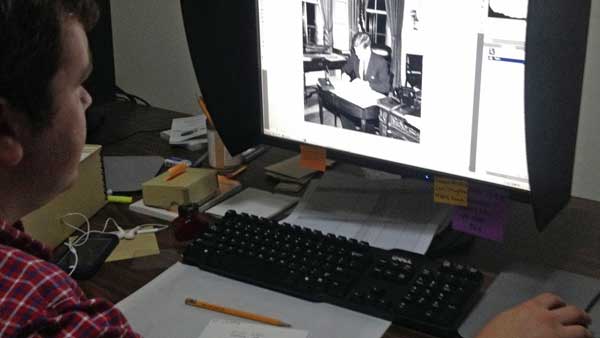Joe Fretwell is first Furman student to intern at the JFK Presidential Library

Not everyone gets to examine the Presidential mailbag. But this summer, that’s exactly what Joe Fretwell ’16 got to do.
In Fretwell’s case, he was reading and digitizing correspondence from the John F. Kennedy era, ranging from questions by inquisitive 5-year-olds to wisdom shared by grandmothers. One read something like this:
“Dear President Kennedy . . . My son John came home with a question today — Mommy, why do the people in Mississippi not let a little colored boy go to school? Can you send John and his first grade classmates an answer that they can understand? I have tried, but I do not think I gave him an answer to satisfy him.”
“It was eye-opening,” said Fretwell, a political science major from Columbia. “It has been interesting to see how much influence average citizens had on the policy agenda and general discussion in the White House.”
Fretwell spent six weeks as the first Furman student to intern at the John F. Kennedy Presidential Library in Boston. He then completed an internship in Congressman Jim Clyburn’s office (D-SC 6th District) in Washington, D.C., thanks to support from the Political Science Department and the Furman Advantage program.
While at the JFK Presidential Library, he scanned 180 photographs from the White House Photographs collection and conducted archival research, writing short biographies about people appearing in each photograph. He learned principles of cataloging archival photographs and spent one day each week conducting his own independent research.
One of his most challenging assignments was identifying local civil rights activists present on September 5, 1963, the day President Kennedy signed a bill making the Frederick Douglass Home in Washington, D.C., part of the National Park Service.
“Most of the research I did was new to the National Archives and Records Administration, meaning I am the first person to have catalogued the information for the more local and less-known individuals in the photographs,” Fretwell said.
He spent much time working with the papers of White House staffers such as Lee C. White and Burke Marshall, where the names of civil rights activists Martin Luther King Jr., Ralph Abernathy, A. Phillip Randolph and James Baldwin were routinely mentioned.
“It’s been exciting to work with photographs and documents of some of the most powerful and renowned people of the 1960s, but I’ve enjoyed even more the fact that I can see and read about the unknown, sometimes nameless citizens who stepped up and contributed to the collective effort toward the passing of the civil rights legislation of 1964 and 1965,” Fretwell said.
For Fretwell, the parallels between the 1960s and today were everywhere – from conversations on civil rights to issues of federal oversight to debates over foreign involvement in global crises. “This was all important to me, as a person who is interested in policy work in government, because I got to see what worked and what did not,” Fretwell said. “Our history matters. It matters to our well-being as Americans, to the direction of our conversations on national issues, and to the routes we ultimately decide to take towards progress.”
Fretwell currently serves as president of Furman’s student body and as a member of The Riley Institute’s Advance Team. He is a member of NAACP, the College Democrats and is a Hollingsworth Scholar.